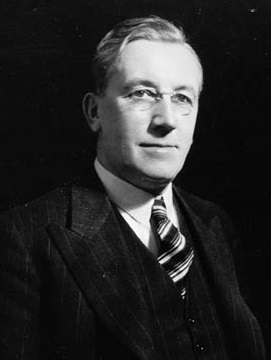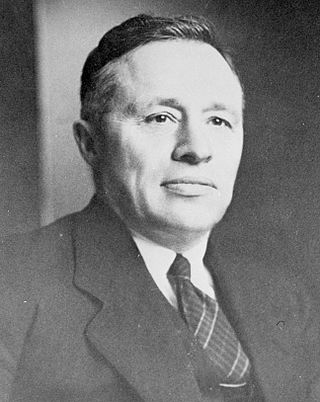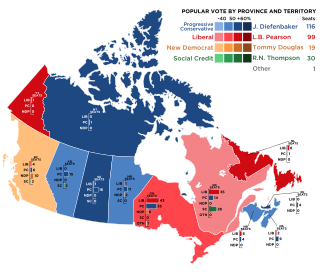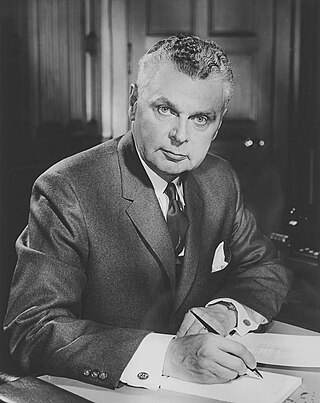
The Ontario New Democratic Party is a social democratic political party in Ontario, Canada. The party sits on the centre-left of the political spectrum and currently forms the Official Opposition in Ontario following the 2018 general election. It is Ontario’s provincial wing of the federal New Democratic Party.

Wilbert Ross Thatcher, was a Canadian politician who served as the ninth premier of Saskatchewan from 1964 to 1971. Thatcher began his career as a member of the Co-operative Commonwealth Federation in 1942, elected first to Moose Jaw City Council and then in 1945 as a Member of Parliament representing Moose Jaw. In 1959, Thatcher made the switch both to Saskatchewan provincial politics and to the provincial Liberal Party, which he led through four provincial elections, winning majority governments in 1964 and 1967. Following his defeat in the 1971 provincial election, Thatcher retired from politics and died shortly afterwards.

Hazen Robert Argue was a Canadian politician who served in the House of Commons and the Senate. He was first elected as a Co-operative Commonwealth Federation (CCF) Member of Parliament (MP) in 1945 and was the last leader of the party, from 1960 to 1961. He crossed the floor to the Liberal Party in 1962 and was defeated in 1963. In 1966 he was appointed to the Senate. He entered the federal cabinet in 1980, as the only Saskatchewan representative, with responsibilities for the Canadian Wheat Board. He is well known for being a strong proponent of the proposed Canadian annexation of the Turks and Caicos Islands. He was the first senator ever to have been charged with fraud, in 1989. The charges were eventually dropped.

The Saskatchewan Progress Party (SPP) is a liberal political party in the Canadian province of Saskatchewan. It was founded in 1905 as the Liberal Party of Saskatchewan, and retained that name until members voted to change it in 2023. Until 2009, the party was affiliated with the Liberal Party of Canada.
The Saskatchewan New Democratic Party, branded as the Saskatchewan New Democrats, is a social democratic political party in Saskatchewan, Canada. The party was founded in 1932 as the Farmer-Labour Group and was known as the Saskatchewan section of the Co-operative Commonwealth Federation (CCF) from 1935 until 1967. While the party is affiliated with the federal New Democratic Party, the Saskatchewan NDP is considered a "distinctly homegrown" party given the role of the province in its development and the party's history in the province.

Major James William Coldwell was a Canadian democratic socialist politician, and leader of the Co-operative Commonwealth Federation (CCF) party from 1942 to 1960.

The 1968 Canadian federal election was held on June 25, 1968, to elect members of the House of Commons of Canada of the 28th Parliament of Canada.

The Alberta New Democratic Party, is social democratic political party in Alberta, Canada. The party sits on the centre-left of the political spectrum and is a provincial Alberta affiliate of the federal New Democratic Party.

Woodrow Stanley Lloyd was a Canadian politician and educator who served as the 8th premier of Saskatchewan from 1961 to 1964. Born in Saskatchewan in 1913, he became a teacher in the early 1930s. He worked as a teacher and school principal and was involved with the Saskatchewan Teachers' Federation, eventually becoming its president.

James Garfield Gardiner was a Canadian farmer, educator, and politician. He served as the fourth premier of Saskatchewan, and as a minister in the Canadian Cabinet.

William John Patterson was a Liberal politician and the sixth premier of Saskatchewan from 1935 to 1944. He was first elected to the Legislative Assembly of Saskatchewan in the 1921 election. He succeeded James G. Gardiner to become the province's first Saskatchewan-born premier.

The 1962 Canadian federal election was held on June 18, 1962, to elect members of the House of Commons of Canada of the 25th Parliament of Canada. The governing Progressive Conservative (PC) Party won a plurality of seats in this election, and its majority government was reduced to a minority government.
Lloyd Cleworth Stinson was a politician in Manitoba, Canada, and the leader of that province's Co-operative Commonwealth Federation (CCF) from 1953 to 1959. Although widely regarded as a capable leader, he was unable to achieve a major electoral breakthrough for his party.

The 1964 Saskatchewan general election was held on April 22, 1964, to elect members of the Legislative Assembly of Saskatchewan.

Socialism in Canada has a long history and along with conservatism and liberalism is a political force in Canada.
The Politics of Saskatchewan relate to the Canadian federal political system, along with the other Canadian provinces. Saskatchewan has a lieutenant-governor, who is the representative of the Crown in right of Saskatchewan; a premier—currently Scott Moe—leading the cabinet; and a legislative assembly. As of the most recent provincial election in 2024, the province is divided into 61 electoral districts, each of which elects a representative to the legislature, who becomes their member, or MLA. In 2024, Moe's Saskatchewan Party was elected to a majority government. Regina is the provincial capital.
John Hewgill Brockelbank was a politician in Saskatchewan, Canada, who served as leader of the opposition in the Legislative Assembly of Saskatchewan.
The New Democratic Party is a federal political party in Canada. Widely described as social democratic, the party sits at the centre-left to left-wing of the Canadian political spectrum, with the party generally sitting to the left of the Liberal Party. The party was founded in 1961 by the Co-operative Commonwealth Federation (CCF) and the Canadian Labour Congress (CLC).

The 2011 Saskatchewan general election was held on November 7, 2011, to elect 58 members of the Legislative Assembly of Saskatchewan (MLAs). The election was called on October 10 by the Lieutenant Governor of Saskatchewan, on the advice of Premier Brad Wall. Wall's Saskatchewan Party government was re-elected with an increased majority of 49 seats, the third-largest majority government in the province's history. The opposition New Democratic Party was cut down to only nine ridings, its worst showing in almost 30 years.

This article is the Electoral history of John Diefenbaker, the thirteenth Prime Minister of Canada.















